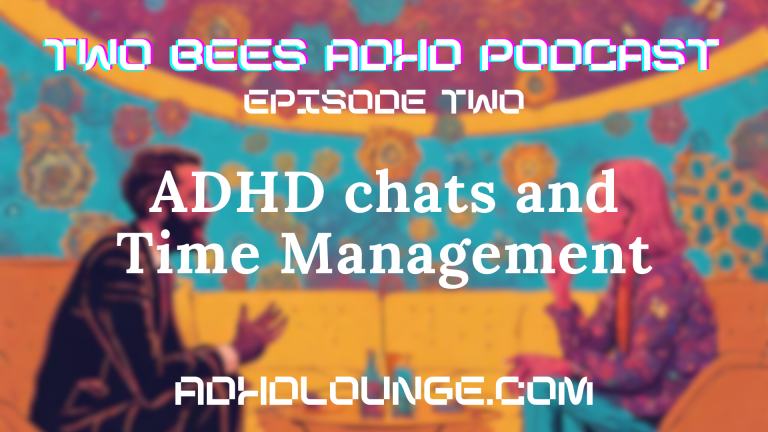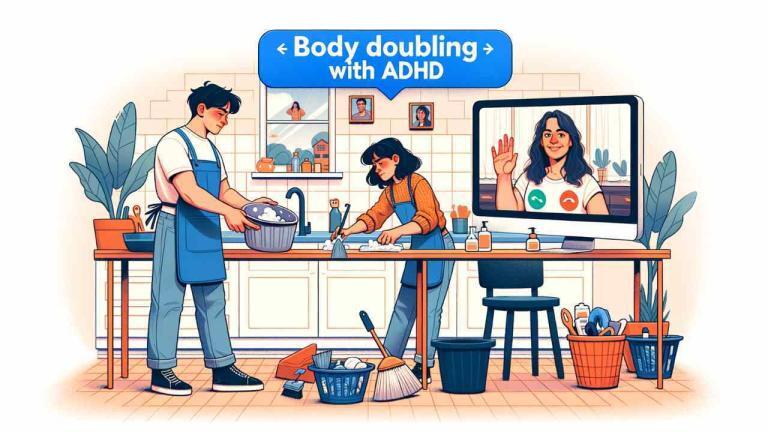From Imposter Syndrome to Success: Unleashing the Power of ADHD

Are you constantly questioning your abilities and feeling like a fraud despite achieving great success? If so, you might be experiencing Imposter Syndrome. But did you know that individuals with ADHD are particularly vulnerable to this phenomenon? In this article, we will explore how ADHD and Imposter Syndrome intersect and how individuals with ADHD can harness their unique strengths to overcome self-doubt and achieve lasting success.
While ADHD is often regarded as a hindrance in a society that values conformity and linear thinking, it actually brings a set of powerful attributes that can set individuals apart in today’s fast-paced and dynamic world. By tapping into their hyperfocus, creativity, and ability to think outside the box, individuals with ADHD can excel in fields where innovation and adaptability are key.
Join us on this transformative journey as we delve into the challenges faced by those with ADHD, uncover the connection to Imposter Syndrome, and discover practical strategies to unlock the hidden potential within. Let’s embrace the power of ADHD and pave the way for a future where neurodiversity is celebrated and everyone can thrive.
Understanding Imposter Syndrome and ADHD
Have you ever experienced that nagging feeling of self-doubt, despite achieving great success in your field? If so, you may be familiar with Imposter Syndrome. This psychological phenomenon affects countless individuals, causing them to question their abilities and feel like frauds. Interestingly, individuals with ADHD are particularly susceptible to Imposter Syndrome, due to the unique challenges they face.
ADHD, or Attention Deficit Hyperactivity Disorder, is often seen as a hindrance in a society that values conformity and linear thinking. However, it’s important to recognize that ADHD also brings a set of powerful attributes that can set individuals apart in today’s fast-paced and dynamic world. By tapping into their hyperfocus, creativity, and ability to think outside the box, individuals with ADHD can excel in fields where innovation and adaptability are key.
The relationship between Imposter Syndrome and ADHD
So, what is the connection between Imposter Syndrome and ADHD? Imposter Syndrome often stems from a fear of being exposed as a fraud, despite evidence of one’s competence. For individuals with ADHD, this fear can be amplified by the challenges they face in areas such as organization, time management, and attention to detail. They may believe that their successes are simply a result of luck or external factors, rather than their own abilities.
The constant struggle to meet societal expectations and fit into a neurotypical mold can further exacerbate feelings of inadequacy and self-doubt. As a result, individuals with ADHD may find themselves trapped in a cycle of self-sabotage, constantly questioning their worth and fearing that they will be discovered as “imposters.”
Signs and symptoms of ADHD
To better understand the impact of Imposter Syndrome on individuals with ADHD, it’s important to recognize the signs and symptoms of ADHD itself. ADHD is characterized by difficulties with attention, hyperactivity, and impulsivity. Some common signs include:
– Inattention: Difficulty staying focused, easily distracted, forgetfulness.
– Hyperactivity: Restlessness, fidgeting, excessive talking, difficulty staying still.
– Impulsivity: Acting without thinking, interrupting others, difficulty waiting their turn.
It’s important to note that ADHD symptoms can vary greatly from person to person, and individuals may experience a combination of inattention, hyperactivity, and impulsivity to varying degrees.
The impact of Imposter Syndrome on individuals with ADHD
While Imposter Syndrome can be particularly challenging for individuals with ADHD, there are strategies that can help manage both conditions and build self-confidence. Here are some practical tips to overcome Imposter Syndrome with ADHD:
1. Recognize your strengths: Rather than focusing on perceived weaknesses or areas of struggle, celebrate your unique talents and abilities. Whether it’s your creativity, problem-solving skills, or out-of-the-box thinking, acknowledge the strengths that ADHD brings to the table.
2. Set realistic expectations: Understand that no one is perfect and that everyone makes mistakes. Avoid comparing yourself to others and instead focus on your own progress and growth. Embrace the journey of continuous learning and improvement.
3. Practice self-compassion: Be kind to yourself and practice self-compassion. Treat yourself with the same kindness and understanding that you would offer to a friend. Remember that making mistakes or facing setbacks does not diminish your worth or abilities.
4. Develop effective coping strategies: Explore different techniques to manage ADHD symptoms and improve focus and organization. This may include creating a structured routine, breaking tasks into smaller, more manageable steps, or utilizing tools such as timers or reminders to stay on track.
5. Seek support: Surround yourself with a supportive network of friends, family, or professionals who understand and appreciate your unique strengths and challenges. Connecting with others who have similar experiences can provide validation and encouragement.
Overcoming Imposter Syndrome with ADHD
Building a strong support network is crucial for individuals with ADHD and Imposter Syndrome. Fortunately, there are numerous resources available to help navigate the challenges and unlock hidden potential. Here are some support networks and resources worth exploring:
1. ADHD support groups: Joining a support group can provide a safe space to share experiences, gain insights, and connect with others who understand the challenges of living with ADHD. Online communities and local support groups offer a wealth of information and support.
2. Therapy and counseling: Seeking professional help from therapists or counselors who specialize in ADHD and Imposter Syndrome can offer valuable guidance and support. Therapy can help individuals develop coping strategies, improve self-esteem, and address underlying emotional issues.
3. Coaching and mentoring: Working with an ADHD coach or mentor can provide personalized guidance and support tailored to your specific needs. These professionals can help you develop strategies for success, set achievable goals, and navigate the challenges of Imposter Syndrome.
4. Educational resources: There are a variety of books, podcasts, and online courses available that provide valuable insights into ADHD and Imposter Syndrome. These resources can offer practical tips, success stories, and tools for personal growth and development.
Strategies for managing ADHD and building self-confidence
It’s inspiring to hear stories of individuals with ADHD who have overcome Imposter Syndrome and achieved remarkable success. These success stories serve as a reminder that ADHD does not define a person’s worth or limit their potential. From entrepreneurs to artists, athletes to scientists, there are countless examples of individuals with ADHD who have harnessed their unique strengths to thrive in their chosen fields.
One such success story is that of Richard Branson, the founder of Virgin Group. Branson openly talks about his struggles with dyslexia and ADHD and how he turned these challenges into strengths. His ability to think outside the box, take risks, and innovate has been instrumental in his entrepreneurial success.
Support networks and resources for individuals with ADHD and Imposter Syndrome
For individuals struggling with ADHD and Imposter Syndrome, seeking professional help is an important step towards understanding and managing these conditions. A qualified healthcare professional or mental health provider can conduct a comprehensive evaluation, provide an accurate diagnosis, and develop an individualized treatment plan.
Treatment options may include medication, therapy, or a combination of both. Medication can help manage ADHD symptoms, improve focus, and reduce impulsivity. Therapy can provide strategies for managing Imposter Syndrome, building self-confidence, and developing effective coping mechanisms.
Success stories of individuals with ADHD overcoming Imposter Syndrome
In conclusion, individuals with ADHD have unique strengths and abilities that can be harnessed to overcome Imposter Syndrome and achieve lasting success. By recognizing and embracing their creativity, hyperfocus, and out-of-the-box thinking, individuals with ADHD can excel in fields where innovation and adaptability are highly valued.
It’s time to shift the narrative around ADHD and Imposter Syndrome, and instead celebrate the power of neurodiversity. Let’s create a future where individuals with ADHD can thrive, where their unique perspectives and talents are recognized and appreciated. By embracing our unique strengths and supporting one another, we can unleash the power of ADHD and pave the way for a more inclusive and successful society.
Seeking professional help for ADHD and Imposter Syndrome
Imposter Syndrome is a pervasive feeling of self-doubt and fear of being exposed as a fraud, even in the face of undeniable achievements. It affects people from all walks of life, but individuals with ADHD often experience it more intensely due to their unique neurodivergent traits. However, many individuals with ADHD have managed to overcome Imposter Syndrome and achieve remarkable success.
One such success story is that of Sarah, a highly creative and innovative entrepreneur with ADHD. Despite her undeniable talent and numerous accolades, Sarah often doubted her abilities and worried that she was just lucky rather than truly skilled. However, with the support of a coach who specialized in working with individuals with ADHD, Sarah was able to recognize her strengths, embrace her unique perspective, and build a thriving business that leveraged her hyperfocus and creativity.
Another inspiring example is Alex, a renowned artist who struggled with Imposter Syndrome throughout his career. Despite his exceptional talent and the praise he received from critics and fans alike, Alex constantly felt like a fraud and feared that people would discover he wasn’t as talented as they believed. Through therapy and support groups for individuals with ADHD, Alex learned to reframe his thoughts and recognize that his ADHD was not a limitation but a source of unique inspiration. This realization allowed him to fully embrace his art and achieve a level of success he had never thought possible.
These success stories demonstrate that individuals with ADHD can overcome Imposter Syndrome and thrive in their chosen fields. With the right support, self-reflection, and a shift in mindset, they can unlock their true potential and achieve lasting success.
Embracing your unique strengths and embracing success
If you are struggling with Imposter Syndrome and suspect that your ADHD might be contributing to these feelings, seeking professional help is crucial. A qualified therapist or coach who specializes in working with individuals with ADHD can provide invaluable support in navigating the challenges of Imposter Syndrome and maximizing your strengths.
Therapy can help you explore the underlying factors that contribute to Imposter Syndrome, such as past experiences, societal pressures, and internalized self-doubt. Through cognitive-behavioral therapy (CBT) techniques, you can learn to challenge negative thought patterns, reframe your beliefs about yourself, and develop a more accurate and positive self-perception.
Coaching, on the other hand, focuses on practical strategies and tools to help you thrive with ADHD and overcome Imposter Syndrome. A coach can work with you to identify your unique strengths and talents, develop effective time management and organizational skills, and create strategies for managing overwhelm and self-doubt. They can also provide accountability and support as you work towards your goals and build confidence in your abilities.
Remember, seeking professional help is not a sign of weakness, but rather a proactive step towards personal growth and success. With the right guidance and support, you can break free from the grip of Imposter Syndrome and embrace your true potential.

Thanks for visiting the ADHD Lounge, feel free to connect and stay in touch!
Sign up for updates!
© 2025 ADHD Lounge, All Rights Reserved.


















































